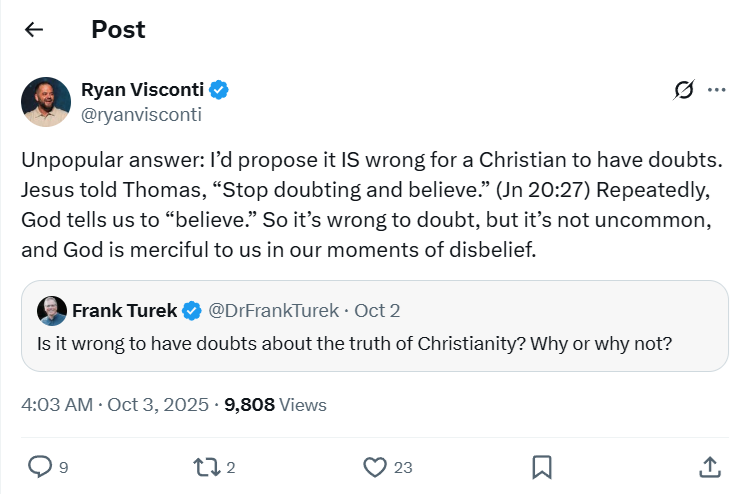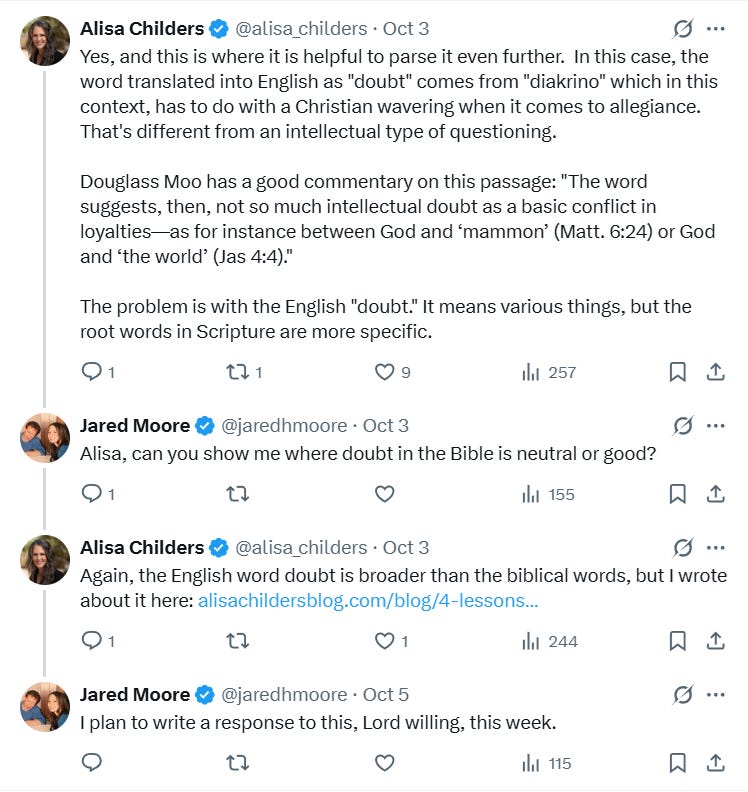Faith Seeking Understanding, Not Doubt Seeking Understanding: A Response to Alisa Childers and Tim Keller
Alisa Childers is a Christian apologist. Last week, she quote-tweeted this tweet from Ryan Visconti,
And she wrote,
I responded with the following tweet, because I thought that what she argues here sounds similar to what A.J. Swoboda and Nijay Gupta argued at Christianity Today in their 2021 article, “Jesus Was the God-Man, Not the God-Superman.” They say that Jesus doubted God at various points of His ministry and life.
And we went back and forth a bit more,
Childers argues that faith, when it is not 100%, is not sin, because it’s doubt not unbelief. But listen to Paul, “For whatever does not proceed from faith is sin” (Rom 14:23), and listen to the author of Hebrews, “And without faith it is impossible to please him, for whoever would draw near to God must believe that he exists and that he rewards those who seek him” (Heb 11:6), and the entire chapter of Hebrews 11. The doubt that she describes does not come from faith but is in opposition to it. It is indeed sin to not believe God at His word 100%. This is why, to be saved, we must have humility like a child, believing whatever the prophets, apostles, and Jesus said (Matt 18:1-4; Luke 18:15-17).
Now, it is good to seek understanding, to say to God, “I believe, help me to understand,” and then to read His word carefully, to gain understanding. But that’s not doubt (even though Childers calls it doubt in her tweet); that’s growth and maturity. We shouldn’t need anyone to dig up the Middle East for us to believe God’s word. Rather, we should take God at His word, for He has spoken through the prophets, apostles (and their close associates), and Christ.
Then, Childers responded by linking to a 2018 article she wrote, “4 Lessons we can Learn From Doubters in the Bible,” to explain what she believes about doubt not being sin. She begins her article with this quote from Tim Keller,
A faith without some doubts is like a human body without any antibodies in it. People who blithely go through life too busy or indifferent to ask hard questions about why they believe as they do will find themselves defenseless against either the experience of tragedy or the probing questions of a smart skeptic. A person’s faith can collapse almost overnight if she has failed over the years to listen patiently to her own doubts, which should only be discarded after long reflection.[i]
Keller is mistaken because doubts are not like antibodies that strengthen your relationship with God; rather, doubts are like cancer cells that harm your relationship with God, and will spread and kill your faith, if you don’t repent and believe.
Jesus had no doubts. Our loved ones in heaven have no doubts. And we will have no doubts in the New Heavens and New Earth. The only people who have doubts in eternity are those burning in hell. Doubt is not a prerequisite for growth or maturity in Christ, faith is.
Doubt cannot be sanctified.
For, to doubt God or His word, you must believe someone or something else more than Him, whether your own mind, someone else’s mind, a skeptic’s argument, etc. That’s why, the moment Eve began believing the serpent, she disbelieved what God had said, and the result in her heart was that she saw the tree the way the serpent told her to, not God: “So when the woman saw that the tree was good for food, and that it was a delight to the eyes, and that the tree was to be desired to make one wise, she took of its fruit and ate, and she also gave some to her husband who was with her, and he ate” (Gen 3:6). Doubt is literally what caused the fall of mankind into sin: belief in the serpent which was doubt or unbelief toward God.
In the rest of Childers’ article, she lists four doubters from Scripture as positive examples: Habakkuk, the father of the demon-possessed child, the apostle Thomas, and John the Baptist.
First, most of the time when the prophets question God, and every time Christ did, they question not because of doubts but because of God’s revealed will in His word. They appeal to who God is or what He has promised, as to why they’re questioning. They’re not correcting God or doubting Him. Rather, they’re like the martyrs the apostle John saw in Revelation 6:9-11,
9 When he opened the fifth seal, I saw under the altar the souls of those who had been slain for the word of God and for the witness they had borne. 10 They cried out with a loud voice, “O Sovereign Lord, holy and true, how long before you will judge and avenge our blood on those who dwell on the earth?” 11 Then they were each given a white robe and told to rest a little longer, until the number of their fellow servants and their brothers should be complete, who were to be killed as they themselves had been.
The martyrs sound similar to what Habakkuk said in the beginning of his book, “O Lord, how long shall I cry for help, and you will not hear? Or cry to you “Violence!” and you will not save” (Hab 1:2), a quote that Childers says is doubt. Longing for God’s justice is not doubt. And questioning God based on His revealed will is not doubt either. It’s faith seeking understanding, not doubt seeking understanding.
That’s also why Christ cried out, “My God, My God, why have You forsaken Me” (Matt 27:46)? God only forsakes the wicked (Ezek 39:23-24; Micah 3:4), not the righteous; and Christ is perfectly righteous. Therefore, He rightfully cried out to fulfill Psalm 22:1, questioning God forsaking Him. Christ was not doubting but rather trusting in God’s word. After all, a few moments later, Christ cried out, “Father, into your hands I commit my spirit!” And having said this he breathed his last” (Luke 23:46). He never doubted God for even a moment. We too can question God, so long as it’s according to His revealed will, His word, but we cannot doubt God or His word, for that is always sin.
Second, the times when the prophets or Scripture writers doubt, they are sharply rebuked explicitly, like Job was by God in Job 38-42. God’s rebuke can be summarized by Job 38:36: “Who has put wisdom in the inward parts, or given understanding to the mind?” This is a rhetorical question where the only answer is “God.” After all, who was Job, the creature, to correct the Creator? Job responded by repenting:
Then Job answered the Lord and said: 2 I know that you can do all things, and that no purpose of yours can be thwarted. 3 ‘Who is this that hides counsel without knowledge?’ Therefore I have uttered what I did not understand, things too wonderful for me, which I did not know. 4 ‘Hear, and I will speak; I will question you, and you make it known to me.’ 5 I had heard of you by the hearing of the ear, but now my eye sees you; 6 therefore I despise myself, and repent in dust and ashes (Job 42:1-6).
Job, the most righteous man on earth at the time, sinfully questioned and argued with God and sought to correct Him. God sharply rebuked him, and he responded by repenting. Hence, Job’s questioning of God was neither neutral nor good, but was sin that required his repentance.
Moreover, if those in Scripture who doubt are not explicitly rebuked, the history is told in such a way that the reader is supposed to see the doubter as being rebuked for his doubt, like with doubting Thomas. Childers writes about Thomas,
When the time came for his face to face meeting with Jesus, Jesus didn’t scold him for doubting, or shame him into some kind of blind faith. Instead, He offered evidence to back up what Thomas had been told. Only after offering His hands and side to Thomas as evidence of His resurrection did He say, “Stop doubting and believe!”
Thomas’ doubt was rational and cerebral. Jesus answered his intellectual doubt with evidence.
She is mistaken because Christ said to Thomas, “Have you believed because you have seen me? Blessed are those who have not seen and yet have believed” (John 20:29). And Christ explicitly rebuked the eleven apostles in Mark 16:14, including Thomas, “Afterward he appeared to the eleven themselves as they were reclining at table, and he rebuked them for their unbelief and hardness of heart, because they had not believed those who saw him after he had risen.” The emphasis of the text is that we should not be like Thomas, but rather, we should believe the testimonies of Christ and the apostles, without having to see Jesus’s wounds face-to-face.
Third, Childers presents the father of the demon-possessed child in Mark 9:24 as a positive example, when he says, “I do believe; help my unbelief.” But the reason why he said this is because Jesus, when talking to him, said to the crowd, “O faithless generation, how long am I to be with you? How long am I to bear with you (Mark 9:19)?” Jesus explicitly rebuked him for his unbelief in the passage. Also, the Greek word used here translated “unbelief,” is apistia, and it’s rebuked in every other use or context around it in the New Testament: Matthew 13:58; Mark 6:6, 13:58, 16:14; Romans 3:3, 4:20, 11:20, 23; 1 Timothy 1:13; Hebrews 3:12, 19. Here are a few examples where it’s rebuked explicitly in same verse it’s used,
Mark 16:14 – 14 Afterward he appeared to the eleven themselves as they were reclining at table, and he rebuked them for their unbelief and hardness of heart, because they had not believed those who saw him after he had risen.”
Romans 11:20, 23 – 20 That is true. They were broken off because of their unbelief, but you stand fast through faith. So do not become proud, but fear. 23 And even they, if they do not continue in their unbelief, will be grafted in, for God has the power to graft them in again.
1 Timothy 1:13 – 13 though formerly I was a blasphemer, persecutor, and insolent opponent. But I received mercy because I had acted ignorantly in unbelief,
Hebrews 3:12 – 12 Take care, brothers, lest there be in any of you an evil, unbelieving heart, leading you to fall away from the living God.
Hebrews 3:19 – 19 So we see that they were unable to enter because of unbelief [emphasis mine].
Fourth, with John the Baptist, he indeed doubted while in prison, but Jesus responded to him, telling him of His miracles. The narrative is not crafted so that we will follow John the Baptist in his moments of unbelief, but so that we will follow Jesus because He is the Christ. Jesus, by telling John the Baptist’s disciples that He was working miracles and that, “blessed is the one who is not offended by me,” (Matt 11:2-6) showed that He is indeed the Christ, and John the Baptist and his disciples should not be offended by Him; but instead, should persevere in believing that He is the Christ.
That’s what we’re supposed to understand from John’s doubting. We’re not supposed to look at John the Baptist’s doubts as something we should imitate, any more than any other person’s sin in the New Testament. We should not have doubts about who Jesus is. After all, we have even more evidence than John the Baptist had, because we have Jesus’ entire ministry in the Gospels, and His progressive revelation through the apostles (and their close associates), in the rest of the New Testament.
Finally, in Childers’ last tweet to me, she said “the English word doubt is broader than the biblical words,” which is mistaken on her part. The Merriam-Webster dictionary defines doubt as,
Noun,
1 a: a lack of confidence :
has doubts about his abilities
b: an inclination not to believe or accept
a claim met with doubt
2 a: uncertainty of belief or opinion that often interferes with decision-making
b: a deliberate suspension of judgment
3: a state of affairs giving rise to uncertainty, hesitation, or suspense
The outcome is still in doubt.
Verb
1: to call into question the truth of : to be uncertain or in doubt about
He doubts everyone’s word.
2 a: to lack confidence in : distrust
… find myself doubting him even when I know that he is honest …—H. L. Mencken
b: to consider unlikely
I doubt if I can go.
3 archaic
a: fear
… I doubt I have been beguiled!—Sir Walter Scott
intransitive verb
: to be uncertain
All of these definitions of the English word “doubt” refer to unbelief in some form. If Childers disagrees, I must ask, “Which definition of the English word ‘doubt’ toward God or His word do you believe is neutral or good according to Scripture?”
The bottom line is that doubt cannot be sanctified. It is unbelief both biblically and according to our English language. The answer to doubt is to take God at His word. To say, “I believe, help me to understand,” not to say, “I believe, help my unbelief.” For, anything that does not proceed from faith is sin (Rom 14:23), and doubt does not come from faith; therefore, to doubt God, Christ, His Holy Spirit, or His word, is always sin.
We believe and seek understanding. We do not doubt and seek understanding.
[i] Keller, Timothy (2008-02-14). The Reason for God . Penguin Publishing Group. Kindle Edition, location 192







Kellerism seems to be at the root of so much chaos in the church these days. It’s fueling confusion and chaos. It’s concerning. But it’s no longer hidden. The veil has been pulled back for those with eyes to see. Excellent article!